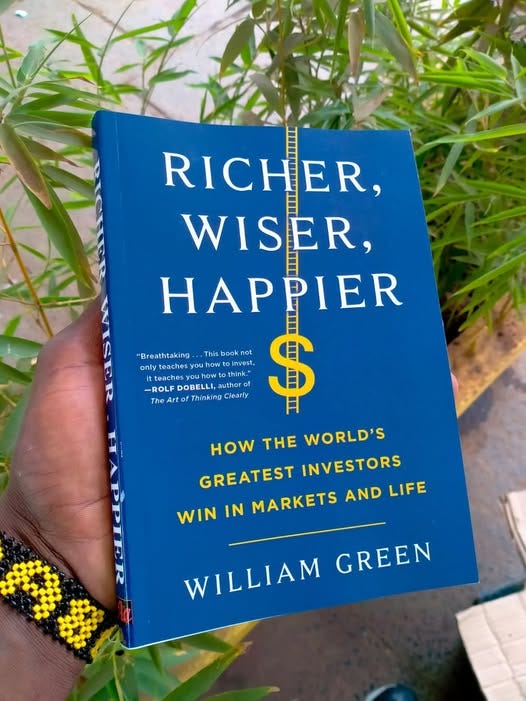Book Review — “Richer, Wiser, Happier” by William Green
Book Review — “Richer, Wiser, Happier” by William Green

When I first saw the title Richer, Wiser, Happier, I nearly dismissed it. It sounded like one of those “get-rich-quick” manuals that mistake slogans for wisdom. But after reading about it in David Alade’s newsletter, I decided to give it a chance. I’m glad I did. Published in 2021, this 300-page book by journalist William Green is less of a manual for wealth accumulation and more of an exploration of the quiet intelligence that underpins lasting success.
Green, who has written for The New Yorker and The Economist, spent over two decades interviewing some of the greatest investors of our time. His subjects include Charlie Munger, Warren Buffett, Joel Greenblatt, Sir John Templeton, Bill Miller, Jack Bogle, Nick Sleep, and Mohnish Pabrai. These are not mere profiles. Green extracts life lessons that transcend finance, using their stories to illuminate the acceptance of uncertainty and the psychology of decision-making.
From the very beginning, Green makes it clear that this is not a book about quick riches. “If people can’t tell you how they do it,” warns one investor, “and you can’t understand what they do, that’s probably not the best spot to be in.” It’s a piercing reminder that transparency and understanding are the real safeguards against financial ruin. One memorable anecdote tells of a client who sought a guaranteed 12 percent annual return and was told by a broker that such consistency was impossible. The client ignored that advice and went on to invest with Bernie ‘The Greatest Ponzi Schemer’ Madoff. “Know what you own,” the investor later said. That’s the golden rule of risk management.
Green’s narrative flows easily, interlacing wisdom with humanity. Each chapter unpacks how legendary investors cultivate patience and emotional resilience. The key idea running through the book is that temperament matters more than intelligence. The markets test one’s patience and humility more than one’s ability to calculate. Munger’s famous “law of inversion” — the habit of thinking backwards, of asking what to avoid rather than what to chase — embodies this philosophy. The best investors, Green shows, spend more time avoiding stupidity than seeking brilliance.
What makes the book so unexpectedly moving is how these financial giants grapple with impermanence. Green writes that many of them “live with the understanding that everything passes, everything changes.” Success, failure, wealth, and loss — all are temporary states. The great investors, he suggests, learn to be comfortable with uncertainty. They find calm in the storm not by denying volatility, but by embracing it. It’s an emotional discipline that serves well in both markets and life.
Reading Richer, Wiser, Happier reminded me that the best investment writing is really about psychology, what many people who have read Morgan Housel’s Psychology of Money would relate to. Green has a gift for distilling complex ideas into simple insights without dumbing them down. He quotes one investor saying, “The best way to enjoy success is to deserve it.” That sentiment anchors the book: prosperity should be earned with integrity and patience, not seized through shortcuts. Many of these investors missed out on fads like Bitcoin, but their refusal to chase trends underscores a timeless truth. Sometimes wisdom is knowing what not to touch.
The book also draws attention to the quiet virtues of humility and gratitude. Despite their wealth, many of Green’s subjects live modestly. They avoid debt and give away much of what they earn. They see money as a tool for freedom, not validation. This perspective is increasingly rare in an age that equates wealth with worth.
Green’s writing is accessible. He avoids technical jargon, opting for storytelling that keeps you engaged whether you know markets or not. His conversations with people like Templeton and Bogle reveal how true success often stems from moral clarity. Templeton’s contrarian faith in human progress, Bogle’s belief in democratizing investing through index funds, and Sleep’s quiet dedication to long-term value — all point to a deeper theme: wisdom, not speculation, is the real edge.
One of my favorite sections is the “Notes on Sources and Additional Resources.” Most writers treat bibliographies as formalities. Green turns his into a masterclass in curation. The section reads like a guide for lifelong learning, packed with references to books and speeches that expand the reader’s understanding of investing and human behavior. It’s a reminder that the pursuit of wisdom never ends.
The title of the book “Richer, Wiser, Happier” is the book’s flaw. It sounds like something you’d find on a motivational poster. Yet the substance within redeems it completely. It’s not about getting rich, but about getting better — more thoughtful, more resilient, more content.

